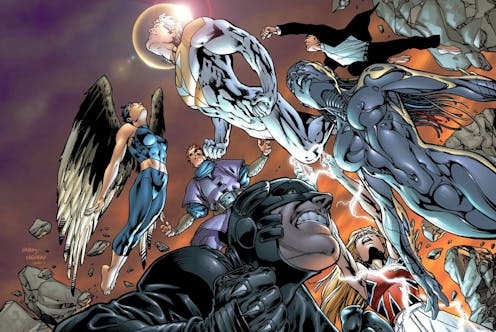how comic book writers and artists are forgotten during the superhero film boom
- Written by Martyn Pedler, PhD Candidate, Swinburne University of Technology

When the new creative head of DC Studios, James Gunn, announced[1] their upcoming slate of films and TV, it included many names you might expect: Superman, Batman, maybe even Swamp Thing.
It also included some lesser-known and leftfield picks, such as the take-no-prisoners superhero team The Authority. The team’s co-creator, artist Bryan Hitch, found that out when everyone else did. “The Authority…?” he tweeted[2]. “I’m glad someone told me…”
Comic book creators forgotten
This kind of disrespect to comic book creators is nothing new. As recounted in Tom De Haven’s book Our Hero: Superman On Earth[3], Superman’s co-creator wrote a furious press release about the upcoming Superman movie in 1975:
I, Jerry Siegel, the co-originator of Superman, put a curse on the Superman movie! I hope it super-bombs. I hope loyal Superman fans stay away from it in droves. I hope the whole world, becoming aware of the stench that surrounds Superman, will avoid the movie like a plague. Why am I putting this curse on a movie based on my creation of Superman? Because cartoonist Joe Shuster and I, who co-originated Superman together, will not get one cent from the Superman super-movie deal.
For most comic creators, not much has changed. Ed Brubaker, who co-created the Winter Soldier for Marvel’s Captain America comics, also saw his character burst onto the big screen. He wrote[4]:
For the most part, all Steve [Epting, co-creator] and I have got for creating the Winter Soldier and his storyline is a thanks here or there, and over the years that’s become harder and harder to live with.
Brubaker is referring to the “special thanks” that appear in the credits of blockbuster movies, briefly listing the names of comic writers and artists whose work influenced the films. Sometimes that’s all they get, according to The Guardian[5], sometimes they will receive a flat fee if they lawyer up – like Jim Starlin did, creator of the supervillain Thanos – they can sometimes manage more. Compared to the global box office for superhero movies, though, these payments are pittances.
Work for hire
There are multiple reasons for these tactics from Marvel and DC Comics. First is that the writers and artists create characters under strict “work-for-hire” contracts, granting the publishers full ownership. But it’s also that superhero movies usually aren’t straight adaptations of particular comic book storylines. They pluck what they want to use from a decades-long continuum of stories by a wide variety of writers and artists, making credits more complicated.
That’s why movies and TV have settled on “characters created by”. This, too, is problematic. Take the recently cancelled Doom Patrol TV series. Its credits list Arnold Drake, Bob Haney and Bruno Premiani, who created the original version of the team in 1963. But the show is undeniably based on the cult run of Doom Patrol comics by Grant Morrison and Richard Case that began in 1989. They are not credited – even though Morrison was name-checked by the fourth-wall-breaking villain Mister Nobody.
Comic fans were heartened by Gunn’s announcements[6], as he pointed to comics by beloved creators for adaptation such as Grant Morrison and Frank Quietly’s All-Star Superman, and Tom King and Bilquis Evely’s Supergirl: Woman of Tomorrow. These aren’t just a matter of ladling out characters, stories and themes from the expansive sea of superhero comics, they’re specific comics by specific authors. “Characters created by” just won’t do.
Gunn took pains to say he wasn’t creating a “Gunnverse” of films and TV filtered only through his auteurist vision. “The stories are completely different,” he said, “and each has the individual expression of the writers and the director that are making those projects.” But comic book authors have that same kind of individual expression, and that is usually ignored in favour of treating their work as raw content, ready to be reshaped and repackaged.
Gunn announced that comics writer Tom King has been acting in an advisory role for DC Studios, and hopefully this means he’ll be receiving more than a token payment and a “special thanks”. Most comic creators won’t be so lucky.
Open hearts and open purse strings
A few years ago, the co-creator of Marvel’s gun-toting Rocket Raccoon from Guardians of the Galaxy, Bill Mantlo, was in a nursing home with a traumatic brain injury. His brother set up a GoFundMe, asking fans to chip in for his care. As the New York Daily News reported[7], “the $100,000 Mantlo is asking for is .0083% of the reported $1.2 billion Avengers: Endgame made worldwide during its opening weekend”.
Read more: 'Any means necessary': the police who adopt the skull symbol of the ultra-violent comic book vigilante the Punisher[8]
Marvel, under growing public pressure, eventually did come to a financial agreement with Mantlo – although, as his brother said[9], “My attorney is very good. I’m not going to say Marvel came to me and opened up their hearts and their purse strings.”
Some say that comic creators willingly signed these contracts, so they don’t deserve any further compensation if their characters earn billions for movie studios. Superheroes, however, don’t care about what’s legal. They care about what’s right.
Marvel and DC should embrace the ethics of their own characters and do the right thing – without needing to be blackmailed or bullied first.
References
- ^ announced (www.hollywoodreporter.com)
- ^ tweeted (twitter.com)
- ^ Our Hero: Superman On Earth (yalebooks.yale.edu)
- ^ wrote (www.theguardian.com)
- ^ The Guardian (www.theguardian.com)
- ^ announcements (www.hollywoodreporter.com)
- ^ reported (www.nydailynews.com)
- ^ 'Any means necessary': the police who adopt the skull symbol of the ultra-violent comic book vigilante the Punisher (theconversation.com)
- ^ said (www.nytimes.com)

















